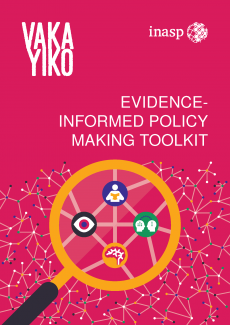
Evidence-Informed Policy Making (EIPM) Toolkit
Download publication files
The Toolkit focuses on finding, evaluating and communicating evidence as well as developing practical implementation plans.
We recognize that there are complex barriers to effective EIPM. In light of this, the Toolkit takes an interdisciplinary approach combining: policy analysis, information literacy, research skills and communication techniques.
The full course is composed of four modules which together make up eight to 10 days of training:
- Introduction to Evidence-Informed Policy Making, including the role of evidence in policy-making process; different kinds of evidence, who uses them and why.
- A Complete Search Strategy, including how to access different types evidence in developing countries, using networks, and searching databases effectively.
- Assessing Evidence, including analysing source, credibility, bias and quality, as well as basic principles of research methodology.
- Communicating Evidence, including tailoring messages to decision makers, writing policy briefs, preparing infographics and oral presentations.
The materials are designed to be adaptable, and the modules and activities can also be delivered individually or incorporated into other courses. The course is practical and activity-based, centred around participants’ own experience in the workplace, and adaptable for different sectors.
For each module, there is a Trainers’ Manual containing; handouts, activities, presentations and readings to deliver training in EIPM. This also includes an Action Planning template and a set of activities that can be used to develop individual or departmental Action Plans for EIPM.
Also included in the Toolkit is a series of corresponding Practical Handbooks for civil servants and parliamentary staff, as well as some associated promotional resources to raise awareness about evidence use in public institutions.
